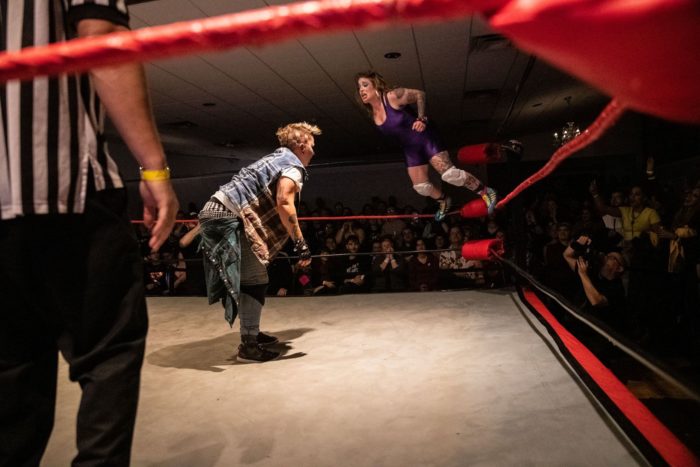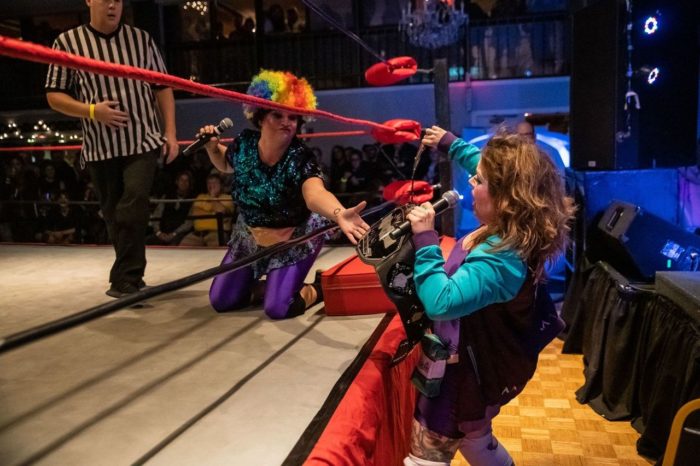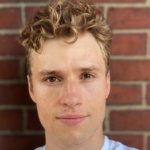
For the Boston League of Wicked Wrestlers, the fight inside the ring is barely half the battle
The crowd shrieks as Becky hoists Cherrill onto her shoulders for the finishing slam. It’s the 2019 Bell of the Brawl, and Becky, the white-privileged heel of the Boston League of Wicked Wrestlers, appears moments away from winning a championship belt.
Cherrill begs for help, but her partner Pammmmmmmmmmmmy (“half the m’s are silent”) shakes her head. The Bradlees Babes were once an inseparable pair of townie Massholes, but they’ve been feuding.
Yet suddenly, Pammmmmmmmmmmmy has a change of heart. She leaps for the tag and steps into the fray, as 350 fans packed into ONCE Ballroom in Somerville cry out in ecstasy.
Heather Mack, as Pammmmmmmmmmmmy is known outside the ring, is at home in BLOWW’s lovingly over-the-top pageantry. Before wrestling, she spent about a decade rapping as part of a queer hip-hop group. She co-hosts Make it Stop, a podcast devoted to gleefully mocking bad music (the podcast’s logo depicts a whimsical music staff emerging from a cartoon butt). Her Everett living room is filled with hundreds of VHS tapes spanning ’90s animation to hypnosis.
Mack’s podcast co-host Mike Dunn says her extroverted energy can be overwhelming for some.
“Heather is extremely intimidating when you first meet her, because she has a big, loud personality and she doesn’t like everyone right away,” agrees Shay Curran, Cherrill’s alter ego. “You’ve got to do the work and prove that you’re cool enough to hang with Heather.”
For Mack, a love of wrestling, VHS tapes, and bad tunes are just facets of her true obsession: fighting for marginalized voices to be heard. With her purple-streaked hair and gap-toothed smile, Mack has helped transform the Boston League of Wicked Wrestlers, or BLOWW for short, into a subversive, queer-friendly organization. Outside the ring, she spent years working with youth as well as adults as the radio station manager and youth media program director at Somerville Media Center, a public access media outlet.
In the ring, Pammmmmmmmmmmmy is known to sport a garish windbreaker and fanny pack. She’s a goofy, loud, and over-the-top caricature, but she’s also a statement on class and a reference to Mack’s background. “You know, Pammmmmmmmmmmmy and Heather, we’re different, but we have a lot in common,” Mack says. “We have a lot more in common than we don’t.”
Origin story
Mack spent her childhood summers at Camp Middlesex in Ashby, where she wrote silly plays based on inside jokes no parent could possibly understand. It was the only place where she felt free. “I could go away for one week or two weeks or three weeks and have the time of my life and be whoever I wanted to be,” Mack remembers.
In affluent Acton, where she lived with her mother and sister, Mack was intensely aware of the things she didn’t have: married parents, a car that consistently ran, regular trips to the dentist. “When you’re younger, you really don’t know the context of what class is,” Mack says. “You just kind of internalize a lot of that stuff, and you think that there’s something wrong with you or there’s something wrong with your parents.”
Mack remained an excellent student through high school, even in rebellious times when she began to skip class. After her mother received a cancer diagnosis in her senior year, though, she says she started making bad decisions. Mack earned admission to Emerson, but couldn’t afford the tuition, which made her efforts up to that juncture seem pointless.
“Okay, you’re going to tell me that I’m less than everyone,” she remembers thinking. “This is what you expect for me, so I’m just going to do what you expect.”
Mack wound up at UMass Amherst instead, where she was introduced to community organizing as well as Dunn, her future BLOWW co-host, and her future husband Alex. Since graduating, she has devoted her professional life to expanding resources and opportunities to kids through art. As a learning site coordinator of the Mystic Learning Center, she helped students produce a musical that worked to bring recycling access to public housing projects in the neighborhood. At Somerville Media Center, she instructed on everything from animation to photography to music production.
“It’s like a family, it’s a really cool community,” Mack says of SMC. “It’s that special place that I had when I was a kid.”

The ring
Curran recalls the night Mack and two other wrestlers confronted a fan who had shouted a homophobic slur during a match. When the man doubled down and his girlfriend tried to step in, Mack made clear that was a mistake.
“I think Heather literally says, like, Oh, you think you can step to this?” Curran remembers. “Like, Oh, you think this is a competition? I will squash you. If I was not her friend, I would have been peeing myself, because she was intimidating as fuck in that moment.”
Mack says intolerance from fans is one thing. What’s been even more concerning in the past, at one point even leading to a schism within BLOWW (then known as the Boston League of Women Wrestlers), is intolerance within.
In one rift, the old group argued about whether performing as luchadores on Cinco De Mayo would amount to cultural appropriation. The attitude of the older wrestlers, according to Mack: Why would we be worried about offending people? BLOWW is all about offending people. Mack was livid.
“I want to offend the system,” she says. “I want to offend white supremacy. I do not want to offend people of color that are in our own organization telling us this is wrong.”
Then, a member came out as nonbinary, which raised the question of whether BLOWW should continue to call itself a women’s wrestling league. Meetings and emails failed to bridge the divide. Several members left, leaving Mack and the other remainders to rebuild as the Wicked Wrestlers with an explicitly feminist, queer, and inclusive ethos.
Mack isn’t self-congratulatory about this—she says there’s more work for BLOWW to do, especially on racial diversity. But she is happy to celebrate one aspect of the league’s transformation: the members’ improvements in the ring.
Before the split, the wrestlers never received formal training, and they mostly fought on gym mats on the dirty floors of Boston clubs. Since the rebrand, they’ve switched from small, monthly gigs to four big shows a year (at least when the pandemic isn’t getting in the way). Also, experienced local trainers help prepare them for their matches, which are held in an actual ring.
“It was fun [the old way], but in terms of the wrestling skills on display, it was very rinky-dink,” Dunn says. “Now, they can hang. They put on an amazing show. Really, it’s crazy how far they’ve come.”
Mack doesn’t hide her joy when she talks about wrestling and everything that surrounds it, from planning wacky storylines to signing the sneakers, T-shirts, and boobs of fans waiting to get into the show. She waves her arms in excitement as she describes the closing moments of the 2019 Bell of the Brawl.
“Clothesline, big boot, and then a power slam!” she remembers, miming each move. “That is definitely one of my best moments ever—not just as a wrestler.”
Pammmmmmmmmmmmy and Cherrill’s Bradlees Babes wound up losing the match. Rich girl Becky got away with a cheap shot, but it didn’t matter: The Bradlees, in all their tacky, townie glory, were back together.
And when BLOWW returns from hiatus on Oct 30 with a show at the Armory, the Babes will step in the ring proud of who they are and where they come from.
“We’re hungry for a belt,” says Mack. “Bradlees Babes are coming back in 2021 ready to fight.”
John is a freelance journalist based in Boston and Portland, ME. He's a graduate of Middlebury College and current grad student at Boston University, where he writes and podcasts about courts, sports, and pop culture.

